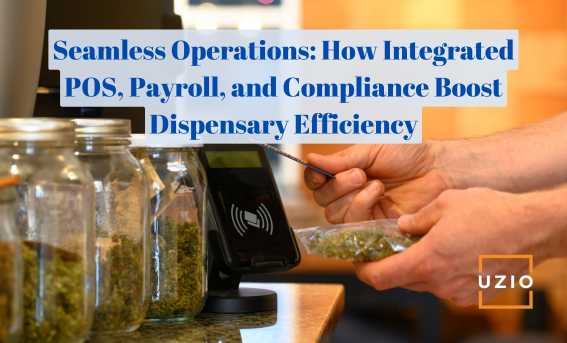Quick links
- Introduction: Why Dispensaries Need an Integrated Tech Stack
- Key Components of a Seamless Dispensary Tech Stack
- Benefits of Integrating Payroll, POS, and Compliance
- How Integration Works: Real-Time Data Flow Between Systems
- Overcoming Integration Challenges
- Conclusion: The Path to a Fully Integrated Cannabis Dispensary
1. Introduction: Why Dispensaries Need an Integrated Tech Stack
The cannabis industry operates in a highly regulated and fast-paced environment where compliance, payroll, and inventory management must work together seamlessly. However, many dispensaries still rely on disconnected systems, leading to operational inefficiencies, payroll errors, and compliance risks.
For example, when POS (Point of Sale) systems don’t sync with payroll software, tracking employee hours, commissions, and tips becomes a manual and error-prone process. Similarly, disjointed compliance tools make audits and reporting tedious, increasing the risk of penalties for regulatory violations.
Why Integration Matters for Dispensaries
By unifying payroll, POS, and compliance tools, dispensaries can:
- Automate payroll processing – Eliminate errors in wages, tips, and overtime calculations.
- Ensure real-time compliance – Seamlessly track tax withholdings, labor laws, and cannabis regulations.
- Improve financial insights – Access accurate, real-time data for smarter business decisions.
- Enhance operational efficiency – Reduce time spent on manual data entry and reconciliation.
A Competitive Edge for Cannabis Businesses
Unlike traditional retailers, dispensaries must comply with unique state and federal regulations, such as IRS 280E and METRC reporting. An integrated tech stack streamlines these processes, allowing dispensaries to focus on growth, customer experience, and employee satisfaction.
In the next sections, we’ll explore the key components of an integrated dispensary tech stack and how they work together to simplify payroll, improve compliance, and drive business efficiency.
2. Key Components of a Seamless Dispensary Tech Stack
To ensure efficiency, compliance, and smooth operations, dispensaries need a fully integrated tech stack that connects payroll, POS, compliance, and inventory management. Here are the core components that every cannabis business should unify:
1. Point of Sale (POS) System
A dispensary’s POS system is the backbone of its operations, handling sales transactions, product tracking, and customer data. When integrated with payroll and compliance software, a POS system can:
- Track employee hours through clock-in/out functionality.
- Calculate commission-based pay for budtenders.
- Ensure sales data aligns with compliance reports for effortless auditing.
2. Payroll & Time Tracking Software
Payroll in the cannabis industry is more complex due to tip reporting, commission structures, and overtime calculations. An integrated payroll system ensures:
- Accurate, automated payroll processing for hourly, salaried, and tipped employees.
- Tax compliance, including IRS 280E considerations and state labor laws.
- Seamless integration with POS for real-time earnings calculations.
3. Compliance & Reporting Tools
Cannabis businesses operate under strict regulations, requiring real-time tracking and reporting to agencies like METRC, BioTrack, and state tax boards. Integrated compliance tools help by:
- Automatically generating compliance reports from POS data.
- Tracking inventory movement to prevent discrepancies.
- Ensuring accurate tax calculations to avoid penalties.
4. Inventory Management System
An integrated inventory management system syncs with POS and compliance tools to:
- Track product levels in real-time to avoid stockouts or overstocking.
- Ensure regulatory compliance by maintaining proper seed-to-sale tracking.
- Streamline reordering processes based on historical sales data.
5. Scheduling & Workforce Management
Managing staff schedules manually can lead to inefficiencies. By integrating scheduling software with payroll and POS, dispensaries can:
- Automate shift scheduling based on sales demand.
- Ensure compliance with labor laws, like overtime rules.
- Improve employee experience by offering self-service scheduling options.
Why Full Integration Matters
A fully connected dispensary tech stack eliminates manual errors, enhances efficiency, and simplifies audits. With real-time data flow between payroll, POS, compliance, and inventory systems, dispensaries can:
- Pay employees accurately and on time.
- Ensure seamless tax and compliance reporting.
- Improve business decision-making with data-driven insights.
In the next section, we’ll explore the benefits of integrating these systems and how they impact dispensary operations.
3. Benefits of Integrating Payroll, POS, and Compliance
A fully integrated tech stack enhances operational efficiency, reduces errors, and ensures regulatory compliance. Here’s how linking payroll, POS, and compliance tools benefits cannabis dispensaries:
1. Accurate Payroll Processing
- Ensures correct employee payments by tracking hours worked, commissions, and tips directly from the POS system.
- Reduces payroll errors by automating calculations for overtime, bonuses, and deductions.
- Improves employee satisfaction with on-time, error-free payroll processing.
🚀 Example: If a budtender logs overtime hours in the POS system, the payroll system automatically calculates the correct wages, ensuring compliance with labor laws.
2. Real-Time Compliance & Tax Automation
- Prevents regulatory penalties by ensuring tax deductions are accurate and up to date.
- Automates state and federal reporting by syncing real-time sales data with tax compliance systems.
- Simplifies 280E tax reporting by categorizing deductible vs. non-deductible expenses.
🚀 Example: Dispensaries must comply with IRS 280E, which restricts deductions. By integrating compliance software with payroll, businesses can properly allocate labor costs for tax filing.
3. Inventory & Sales Accuracy
- Prevents stock discrepancies by tracking product movement in real-time across POS and inventory systems.
- Enhances sales forecasting by using data insights to predict demand and avoid overstocking or shortages.
- Ensures regulatory compliance by linking sales records to METRC, BioTrack, or other state-mandated seed-to-sale tracking systems.
🚀 Example: If a certain strain sells out faster than expected, the system can trigger an automated reorder or adjust pricing strategies to optimize margins.
4. Operational Efficiency & Business Insights
- Reduces manual work by eliminating duplicate data entry across systems.
- Improves decision-making by offering real-time insights on labor costs, sales trends, and compliance risks.
- Enhances workforce management by allowing automated shift scheduling based on peak sales hours.
🚀 Example: If sales are highest on weekends, integrated data can help managers adjust staffing levels to meet demand while staying within budget.
Why Dispensaries Should Prioritize Integration
A well-connected system not only streamlines payroll and compliance but also empowers dispensaries with data-driven insights. By automating processes, improving accuracy, and reducing risk, dispensaries can focus on growth rather than administrative burdens.
4. How Integration Works: Real-Time Data Flow Between Systems
A fully integrated dispensary tech stack allows seamless communication between payroll, POS, compliance, and inventory management tools. This real-time data flow eliminates manual entry, reduces errors, and ensures accurate financial and compliance reporting.
The Data Flow in an Integrated System
1. Employee Clock-In & Shift Tracking (POS → Payroll)
- Employees clock in via the POS system or time-tracking tool, logging work hours in real time.
- The payroll system automatically records regular hours, overtime, and commissions.
- Tips and bonuses earned through sales get instantly synced to payroll, ensuring accurate compensation.
🚀 Example: A budtender clocks in at the POS terminal, and their hours sync directly to the payroll system, ensuring correct wages without manual input.
2. Sales & Inventory Sync (POS → Inventory Management)
- Every transaction at the POS updates inventory levels in real time.
- The system triggers automatic reorders when stock falls below a certain threshold.
- Integrated compliance software ensures proper seed-to-sale tracking to meet state regulations.
🚀 Example: A popular cannabis strain sells out quickly. The inventory system detects low stock and alerts the manager to reorder before running out.
3. Tax & Compliance Automation (POS + Payroll → Compliance Tools)
- The POS system calculates applicable sales taxes, ensuring real-time tax tracking.
- Payroll automatically applies state and federal deductions while maintaining 280E-compliant records.
- Compliance software prepares audit-ready reports, reducing the risk of fines.
🚀 Example: Instead of manually filing cannabis sales tax reports, the compliance system generates and submits the necessary documentation to the appropriate regulatory body.
4. Payroll Processing & Reporting (Payroll + Compliance → Business Insights)
- Payroll syncs with financial reporting tools, helping track labor costs vs. revenue.
- Owners get real-time dashboards with workforce productivity and profitability insights.
- AI-powered analytics help identify cost-saving opportunities, like optimizing staff schedules to reduce overtime.
🚀 Example: The system analyzes peak sales times and recommends scheduling more staff on weekends while reducing shifts during slow periods.
Why Real-Time Integration Matters for Dispensaries
By automating the flow of data between payroll, POS, and compliance tools, dispensaries can:
- Reduce administrative burden – No more manual data entry.
- Improve compliance – Minimize errors in payroll and tax filings.
- Enhance profitability – Make data-driven staffing and inventory decisions.
5. Overcoming Integration Challenges
While integrating payroll, POS, and compliance tools offers significant benefits, dispensaries may face technical and operational hurdles during implementation. Below are common challenges and solutions to ensure a seamless integration.
| Challenge | Impact on Dispensary | Solution |
|---|---|---|
| Incompatible Systems | Some POS, payroll, and compliance tools may not communicate effectively, leading to data silos. | Choose open API-based software that allows smooth integration between systems. Work with providers that offer custom API connections. |
| Data Sync Issues | Payroll discrepancies due to incorrect or delayed data transfer from POS. | Ensure real-time data sync between POS and payroll with automated refresh cycles to update shifts, sales, and taxes instantly. |
| Compliance Gaps | Misreporting due to lack of automated tracking, risking audits and fines. | Use state-compliant payroll and POS tools that integrate with regulatory bodies for seamless tax filing. |
| Security & Data Privacy | Sensitive employee and customer data at risk due to multiple integrations. | Implement end-to-end encryption and role-based access to limit data exposure. |
| Employee Training & Adoption | Staff struggle to use new integrated tools, leading to operational slowdowns. | Provide hands-on training and step-by-step guides to ease the transition. Work with vendors offering dedicated support. |
| Cost Concerns | Businesses hesitate due to upfront software costs and implementation fees. | Choose scalable, cloud-based solutions with flexible pricing models to start small and expand as needed. |
Best Practices for a Smooth Integration
- Work with a unified software provider – Choosing a platform that bundles payroll, POS, and compliance tools reduces compatibility issues.
- Pilot test before full rollout – Run a trial phase with a small group of employees before deploying across the dispensary.
- Set clear workflows – Establish automated processes for tax calculations, payroll approvals, and sales tracking.
- Leverage vendor support – Many payroll and POS providers offer dedicated integration specialists to assist during setup.
- Monitor and optimize – Use real-time reports to track system performance and fine-tune settings for maximum efficiency.
Key Takeaway:
While integration challenges exist, dispensaries that invest in the right tools and strategies can create a seamless, automated ecosystem that boosts accuracy, compliance, and efficiency.
6. Conclusion: The Path to a Fully Integrated Cannabis Dispensary
A fully integrated tech stack—where POS, payroll, and compliance tools work in sync—is no longer a luxury for dispensaries; it’s a necessity. With the cannabis industry facing tight regulations, complex payroll structures, and real-time compliance demands, dispensaries that embrace automation and integration will gain a competitive edge.
Key Takeaways for Dispensaries:
- Eliminate manual errors – Automating payroll and compliance ensures accurate tax calculations and prevents costly fines.
- Gain real-time insights – Integrated systems provide up-to-the-minute sales, labor, and inventory data, helping dispensary owners make informed decisions.
- Boost efficiency & reduce workload – Syncing payroll with POS and compliance software removes redundant tasks, allowing managers to focus on business growth.
- Ensure compliance without hassle – Automated tracking of sales, taxes, and labor ensures dispensaries stay compliant with state and federal regulations.
- Enhance employee experience – Accurate, on-time payroll and simplified time tracking lead to higher staff satisfaction and retention.
Next Steps: Future-Proof Your Dispensary
As the cannabis market evolves, having a scalable, integrated tech stack is crucial. Whether you’re a single-location dispensary or a multi-state operator, investing in smart technology solutions will position your business for long-term success.
📌 Ready to optimize your dispensary’s tech ecosystem?
Explore how UZIO’s payroll and HR platform seamlessly integrates with POS and compliance tools to keep your cannabis business running smoothly and profitably.
Recommended Reading: Biggest pain point with Payroll and HR software
Get in touch with us for an expert-led demo to know more about UZIO all-in-one payroll software.















